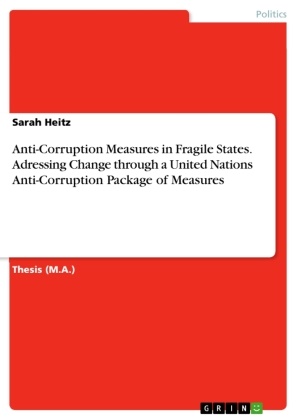Ulteriori informazioni
Thesis (M.A.) from the year 2009 in the subject Politics - Other International Politics Topics, grade: 1,1, University of Augsburg, language: English, abstract: Designing and implementing a national anti-corruption strategy is a long-term and expensive undertaking that will almost always require the assistance of the international community. This study does not explicitly provide recommendations for anti-corruption approaches of donors and/or agencies in fragile states, key elements are pointed out where they strongly affect the recipient governments' political will and capacity for anti-corruption reform. Since the package of measures intends to provide governments with a range of options that enable them to assemble their national strategy, this paper is streamlined to anti-corruption measures in post-emergency or reconstruction phases of emergency situations. Against the background of corruption, this thesis is based on the following structure; it starts with the international level, followed by the transnational and then national level. It then reverses back through the same levels. Chapter 2 sketches anti-corruption efforts by the international community and integrates them into the larger context of development and intervention policy. In addition the chapter outlines certain features of the UNCAC and depicts the work of the CECS. Due to the complexity of the phenomenon of corruption, chapter 3 provides a general background of corruption and profiles the many aspects of government corruption. It then outlines the (anti-) corruption situation and condition in fragile states, the principles of addressing corruption in such environments and the broader principles of an anti-corruption strategy. Chapter 4 intends to exemplify an anti-corruption approach in one country. It highlights key elements of the anti-corruption strategy to examine how they work in practice and to unveil the complexity of such a strategy. It points out the methodology of the country case study and explains why Sierra Leone was chosen. The historic background and the country's development, as well as distinctive corruption processes are highlighted. Emphasis is put on assessing anti-corruption action taken by the two Sierra Leonean Governments after the civil war of 1991 to 2002, as well as on donors' anti-corruption and reconstruction action. Chapter 5 then draws out lessons for tailoring anti-corruption strategies and promotes ideas and recommendations for a UN package of anti-corruption measures for governments of anti-corruption measures for governments in fragile states. Chapter 6 encompasses concluding remarks.

